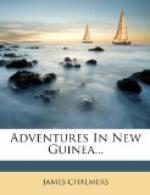Early on Sunday morning, a great many natives went out with their spears, nets, and dogs, to hunt wallabies. A goodly number attended the forenoon service, when Mr. Lawes preached. A good many strangers were present from an inland village on the Astrolabe side. There is not yet much observance of the Sabbath. Poi, one of the chief men of the place, is very friendly: he kept quite a party of his inland friends from hunting, and brought them to the services. Mr. Lawes preached again in the afternoon. As we went to church in the afternoon the hunters were returning: they had evidently had a successful day’s hunting. During the day a canoe came in from Hula, laden with old cocoanuts, which were traded for pottery.
In the evening, an old sorceress died, and great was the wailing over her body. She was buried on the Monday morning, just opposite the house in which she had lived. A grave was dug two feet deep, and spread over with mats, on which the corpse was laid. Her husband lay on the body, in the grave, for some time, and, after some talking to the departed spirit, got up, and lay down by the side of the grave, covered with a mat. About midday, the grave was covered over with the earth, and friends sat on it weeping. The relatives of the dead put on mourning by blackening their bodies all over, and besmearing them with ashes.
On the 31st, the Bertha left for Kerepunu. As I was anxious to see all the mission stations along the coast between Port Moresby and Kerepunu, I remained, to accompany Mr. Lawes in the small schooner Mayri. We left on the following day, and sailed down the coast inside the reef. We arrived at Tupuselei about midday. There were two teachers here, and Mr. Lawes having decided to remove one, we got him on board, and sailed for Kaili. The villages of Tupuselei and Kaili are quite in the sea. I fear they are very unhealthy—mangroves and low swampy ground abound. The Astrolabe Range is not far from the shore we were sailing along all day. There is a fine bold coast line, with many bays.
In the early morning, our small vessel of only seven tons was crowded with natives. We left the vessel about nine a.m. for a walk inland, accompanied by a number of natives, who all went to their houses for their arms before they would leave their village. They have no faith whatever in one another. We passed through a large swamp covered with mangroves—then into a dense tropical bush, passing through an extensive grove of sago palms and good-sized mango trees. The mangoes were small—about the size of a plum—and very sweet. At some distance inland I took up a peculiar-looking seed; one of the natives, thinking I was going to eat it, very earnestly urged me to throw it away, and with signs gave me to understand that if I ate it I should swell out to an enormous size, and die.




